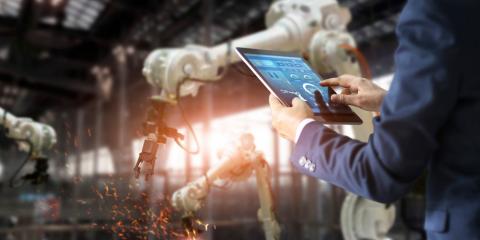Data-driven manufacturing: main challenges

Data-driven manufacturing: main challenges
The wide availability of inexpensive sensors and the ability to connect them to the internet provide great development opportunities and ensure a bright future for the manufacturing industry. The Internet of Things (IoT) and the Industrial Internet in the United States, Industry 4.0 in Europe and 物 联网 (wù lián wăng) in China are all about the same: to collect and analyse big data and to use these data in business processes such as production efficiency, sales and production planning, logistics processes, after-sale services, etc. All this is covered by the concept of data-driven manufacturing.
We at Flanders Make consider data-driven manufacturing one of the major evolutions within the manufacturing industry. It allows companies to lift their production process to the next level by lowering the production cost, increasing product quality and reducing the products’ time-to-market. But there still are a couple of challenges and paradigms that must be addressed.
Processing large amounts of data
Thanks to the wide availability of sensors, the ever increasing power of computers and ever faster internet connections (5G is on its way), the amount of data will only increase. As a business, you receive these data from your production systems as well as your products. This enables you to optimise you production. On the other hand, you also receive valuable feedback from customers using your products. By handling all these data in a smart way, you can manufacture better products more efficiently.
However, the amount of data soon becomes huge so that you might no longer see the wood for the trees. It is therefore important to structure your data properly. You must store data along with information about the context, time indications about their use, etc. Only in this way, you will – later on when you want to use these data – understand what all these bits & bytes are telling you.
From data to intelligent data to actionable data
You can convert data into intelligent data using statistical and artificial intelligence algorithms. Intelligent data will allow you to map opportunities for improving your product and production.
By subsequently combining your intelligent data with specific Artificial Intelligence (AI) and deep learning algorithms, you will generate actionable data. In other words, data are converted into information that can be used as a basis for your decisions. This (semi-)automatic decision-supporting information or these specific recommendations will help your operators to improve your processes, change product/machine settings or conduct root cause analyses of production failures. The information enables products to take (semi-)automatic decisions that result in better performances, higher productivity rates, improved quality, etc.
Collecting the right data
Collecting the right data is not as obvious as you may think. Not only the type of data but also the frequency of saving them is important to be able to properly understand your data. Also the data structures that you will use are crucial for conducting analyses or making comparisons at a later stage. Finally, choices must be made as to where and at which frequency the data are stored and where (for instance, locally or in the cloud) the calculations are executed. All this makes uniform data very important in data-driven manufacturing.
Security in data-driven manufacturing
By connecting your product and production to the internet, these will be open to all kinds of external threats. An ever increasing number of hackers and cybercriminals know this and start focussing their operations on the industrial market. Just imagine that your production is shut down and can but be restarted after having paid a ransom or that your self-driving car is hacked and you lose control over your car. To prevent this kind of problems from happening, it is important to invest in the security of your systems, both on production and product level.
